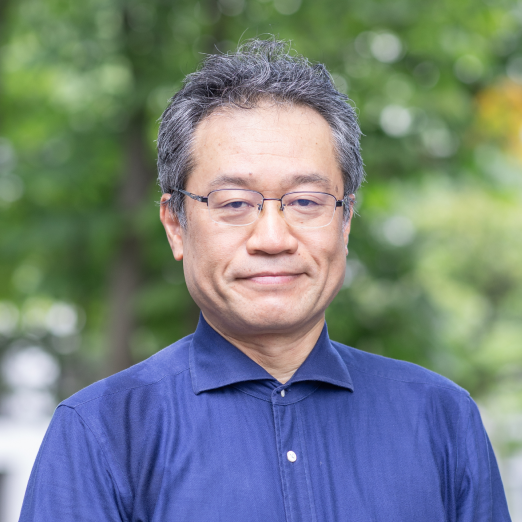
高野 光則 教授
Mitsunori Takano
専門分野
生物物理学
生物の動作機構を原子レベルから理解する
研究テーマ
分子動力学計算による分子機械の動作機構と制御機構の解明
キーワード
分子機械、構造、エネルギー、ダイナミクス、熱ゆらぎ、情報
LINKS
RESEARCH OVERVIEW
研究概要
生命の設計図はDNAの中に書かれている。そこに書かれている情報は蛋白質を作るための20種類のアミノ酸の並べ方(1次元配列)である。蛋白質はアミノ酸が重合した高分子で、つまりは原子の集まりである。しかし、それはランダムな集まりではなく、設計(デザイン)された集まりである。設計図に従って特定のアミノ酸の並びになった直鎖状の蛋白質分子は、その後、特定の立体構造を自発的に形成する。そして分子同士が自発的に集まり散じ、「分子素子(molecular device)」、「分子機械(molecular machine)」として機能する。たとえば私たちの運動機能(筋収縮や心臓拍動)はアクチンとミオシンという2種類の蛋白質が時々刻々と結合・解離する「分子機械」によって駆動されている。
分子機械はいわゆる「機械」のイメージとは異なり、構造安定性がごくわずかしかない。そんなにもろくて柔らかい分子機械がどうやって機能することができるのだろうか? また、分子機械が能動的に機能するためにエネルギーが必要であるが、ナノメートル・サイズの極微の分子機械はどんな種類のエネルギーをどう使っているのだろうか? さらに生命システムという巨大集積回路において、「分子素子」としての蛋白質はどのように情報を記憶し、処理・伝達しているのであろうか?
本研究室では計算物理と最新コンピュータ(GPU)を用い、分子機械、分子素子、生命システムの動作機構と制御機構の解明に原子・分子のレベルから迫っている。
MESSAGE to STUDENTS
学生へのメッセージ
⽣物に関⼼のある⼈はもちろん、これまで⽣物に関⼼が無かった⼈も、物理学が挑むべき最重要課題の⼀つが⽣命現象の理解であることを本学科で実感してください。40億年かけて進化してきた⽣命システムの物理的理解はこれからの医学、薬学、工学に新展開をもたらすはずです。
学歴・経歴
1999 東京大学総合文化研究科 博士(学術)
1999 東京大学教養学部 物理部会 助手
2004 早稲田大学理工学部 物理学科 専任講師
2005 早稲田大学理工学部 物理学科 助教授
2009 早稲田大学 理工学術院 先進理工学研究科 物理学及応用物理学専攻 教授
所属学協会
- 生物物理学会
- 物理学会
- アメリカ生物物理学会
- 分子シミュレーション学会

Kenji YASUDA
Professor
Field of study
Biophysics
Atomic-level understanding of how biological systems function
Research Themes
Unveiling the physical mechanism of functioning molecular machines by molecular dynamics simulations
Keywords
molecular machine, structure, energy, dynamics, thermal fluctuation, information
LINKS
RESEARCH OVERVIEW
The fundamental design of life is written in DNA. The information written there is the arrangement of the 20 amino acids (one-dimensional sequence) used to make proteins. A protein is a polymer composed of amino acids, in other words, a collection of atoms. However, it is not a random collection, but a designed collection. The synthesized amino-acid chain spontaneously forms a specific three-dimensional structure. Protein molecules then spontaneously assemble and disperse, functioning as a “molecular device” or “”molecular machine””. For example, our ability to move (muscle contraction) is driven by the molecular machines in which two types of proteins, actin and myosin, bind and dissociate dynamically.
Unlike the general notion of a “machine,” molecular machines are marginally stable. Then, how can such fragile and soft molecular machines function? Also, how does a nanometer-size molecular machine use the energy it needs to actively function? Furthermore, how do proteins as the molecular devises store, process, and transmit information in the huge integrated circuits of living systems?
Using computational physics and state-of-the-art computers (GPUs), we are going to clarify the operating and regulating mechanisms of molecular machines, molecular devices, and living systems from the atomic and molecular levels.
MESSAGE to STUDENTS
Those who are interested in living organisms and those who are not interested in living organisms will find in this department that one of the most important challenges of physics is to understand the phenomena of living organisms. The physical understanding of the living system, which has evolved over 4 billion years, will bring about new developments in medicine, pharmacy and engineering
Education and Career
1999 Ph. D. (Univ. of Tokyo)
1999 Assistant professor at Univ. of Tokyo (Inst. of Phys.)
2004 Lecturer at Waseda Univ. (Dept of Phys.)
2005 Associate professor at Waseda Univ. (Dept of Phys.).
2009 Pofessor at Waseda Univ. (Dept of Phys.).
Professional Memberships
- Biphysical Society of Japan
- Physical Society of Japan
- Americal Biophysical Society
- Molecular Simulation Society of Japan
